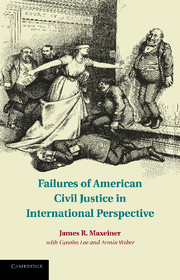Book contents
6 - Process
The Right to be Heard
Published online by Cambridge University Press: 07 September 2011
Summary
The civil action has commenced. Mary Roh has filed a complaint; John Doh Jr. has interposed a defense. They have reached the critical point in their lawsuit when by “the course of the law of the land,” they are to be heard in the cause before the court.
In this chapter we examine “process.” Process occurs in the period after a lawsuit is commenced by party pleading, and before it is concluded in judicial judgment. Process is the legal consideration of material facts and applicable law. If parties dispute which facts are true or material, process provides them the opportunity to persuade the court which are material and to present proof to the court of which are true. If parties disagree with which law governs their dispute or interpret law differently, process provides them opportunity to express their views on governing law. At the conclusion of process, the court applies the determined law to the facts found to produce the characteristic product of civil litigation: a decision according to law of the parties’ rights and duties. That decision is known as a judgment and is the subject of Chapter 7. In this chapter, after a general introduction of process and the centrality to process of the right to be heard, we discuss process in each of our countries specifically, and how process might unfold in the case of Roh v. Doh.
- Type
- Chapter
- Information
- Failures of American Civil Justice in International Perspective , pp. 121 - 199Publisher: Cambridge University PressPrint publication year: 2011

